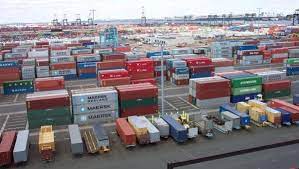President of the Ship Owners Association of Nigeria, Mkgeorge Oyung, yesterday called for the relocation of the residents of Ajegunle, a suburb in Lagos, with a view to enhancing the value of Apapa Wharf.
He stressed the need for the federal and Lagos state governments to recreate the Apapa Port by relocating Ajegunle city, to build a modern logistics city.
Oyung stated this in Abuja, yesterday, at a public hearing of a bill: ‘Nigerian Economic Diversification Bill 2022.”
He noted that NPA was making a total of $2 million (N890,000, 000) instead of $43 billion (19,135,000,000,000) as daily revenue
According to him, the only way to save Apapa port was to relocate Ajegunle by paying compensation ranging from N25 million and N45 million to house owners in the place.
He said, “We can build a proper logistics city as it is located and have 24 hour-trailers loading and movement out of the ports.
“What we have now is Ajegunle port! And the Lekki port is turning out to be the same thing. And we can do the same thing at Lekki.
“Nobody builds a port in the city. Go to Ajegunle anybody that has a Bungalow takes N25m and anybody with a story building takes N45m and you will get back the ports,” he said
The SOAN boss said the Nigerian Ports Authority (NPA) was losing a whooping sum $41billion (N18,245, 000, 000,000) daily due to poor management of the maritime sector, stressing that shipping was the biggest business in the world; hence, Nigeria should pay attention to it.
He said, “Shipping is 90 per cent of global trends and as far as the world is concerned, nothing moves, and nothing goes on without shipping, and without shipping, there is no shopping.
“NPA makes $2 million a day by their revenue, whereas it is an industry that can make $43 billion a day; $1.8 billion an hour and $30m a minute.
“NPA is making $2 million a day, which means something must give way and my suggestion is that we should relocate Ajegunle.”
The SOAN president also noted that the ports were functional, adding that its poor management and lack of diversification that had continued to inhibit the optimisation of NPA.
Talking about the functionality of the ports, Oyung said, “All ports are functioning; the constraints of the ports are a matter of congestion due to poor port management of the port.”

He added, “I am not trying to indict anybody but the fact that you have to manage the ships that come and make sure that the ships that come are producing and discharging and you don’t delay them at the port because the ship only comes to the port, it doesn’t dwell.
“It is supposed to be controlled, however in our port, especially Apapa port, it is so congested that the roads are not only the problem and of course what needs to be done, I have suggested. On other ports, they are bound by infrastructure decay, they are bound by the fact that they are not being utilised.”
He further advised that the Apapa and Lekki ports, “particularly be feeder ports where when the goods arrive and it has a two put of 3,000 containers a day, we don’t see the possibility of all of that being able to leave that port. So, we have other ships that will take them to other ports.”
He added, “If somebody imports a car, there’s really no reason why he should clear it in Lagos. If the car is taken to Port-Harcourt or Warri or Calabar, and cleared there, a person can drive back to Kaduna, Imo, Maiduguri or other states. So, when every car comes to Lagos and we diversify and say that some ports are for the exports, rail road, cars and some ports for minerals, that will help the economy.”
Onyung noted that one of the ways to save the situation, particularly in Lagos was to relocate the Ajegunle community in other to save the ports.

